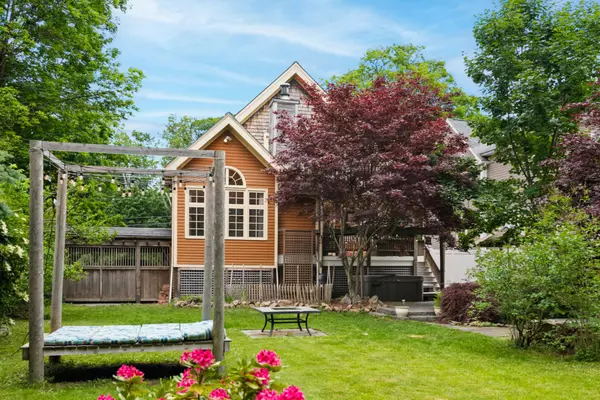
Insights from the "Experts" on the Housing Market Outlook for 2024
If you’re thinking about buying or selling a home soon, you probably want to know what you can expect from the housing market in 2024. In 2023, higher mortgage rates, confusion over home price headlines, and a lack of homes for sale created some challenges for buyers and sellers looking to move. But what’s on the horizon for the new year? The good news is that many experts are optimistic we’ve turned a corner and are headed in a positive direction. Mortgage Rates Expected To Ease Recently, mortgage rates have started to come back down. This has offered hope to buyers dealing with affordability challenges. Mark Fleming, Chief Economist at First American, explains how they may continue to drop: “Mortgage rates have already retreated from recent peaks near 8 percent and may fall further . . .” Jessica Lautz, Deputy Chief Economist at the National Association of Realtors (NAR), says: “For home buyers who are taking on a mortgage to purchase a home and have been wary of the autumn rise in mortgage rates, the market is turning more favorable, and there should be optimism entering 2024 for a better market.” The Supply of Homes for Sale May Grow As rates ease, activity in the housing market should pick up because more buyers and sellers who have been holding off will jump back into action. If more sellers list, the supply of homes for sale will grow – a trend we’ve already started to see this year. Lisa Sturtevant, Chief Economist at Bright MLS, says: “Supply will loosen up in 2024. Even homeowners who have been characterized as being ‘locked in’ to low rates will increasingly find that changing family and financial circumstances will lead to more moves and more new listings over the course of the year, particularly as rates move closer to 6.5%.” Home Price Growth Should Moderate And mortgage rates pulling back isn’t the only positive sign for affordability. Home price growth is expected to moderate, too, as inventory improves but is still low overall. As the Home Price Expectation Survey (HPES) from Fannie Mae, a survey of over 100 economists, investment strategists, and housing market analysts, says: “On average, the panel anticipates home price growth to clock in at 5.9% in 2023, to be followed by slower growth in 2024 and 2025 of 2.4 percent and 2.7 percent, respectively.” To wrap it up, experts project that 2024 will be a better year for the housing market. So, if you’re considering moving next year, know that early signs show we’re turning a corner. As Mike Simonsen, President and Founder of Altos Research, puts it: “We’re going into 2024 with slight home-price gains, somewhat easing inventory constraints, slightly increasing transaction volume . . . All in all, things are looking up for the U.S. housing market in 2024.” Bottom Line Experts are optimistic about what 2024 holds for the housing market. If you’re looking to buy or sell a home in the new year, the best way to ensure you’re up to date on the latest forecasts is to partner with a trusted real estate agent. Let’s connect.

The Perfect Home Could Be the One You Perfect After Buying
There's no denying mortgage rates and home prices are higher now than last year, impacting what you can afford. At the same time, fewer homes are still available for sale than the norm. These are two of the biggest hurdles buyers are facing today. But there are ways to overcome these things and still make your dream of homeownership a reality. As you set out to purchase this season, you'll want to be strategic. This includes looking closely at your wish list and considering what features you need in your next home versus which ones are nice. This will help you avoid overextending your budget or limiting your pool of options too much because you're searching for that perfect home. Danielle Hale, Chief Economist at Realtor.com, explains: “The key to making a good decision in this challenging housing market is to be laser focused on what you need now and in the years ahead, . . . Another key point is to avoid stretching your budget, as tempting as it may be . . .” To help identify what you truly need, list all the features you'll want to see. From there, work to break those features into categories. Here's a great way to organize your list: Must-Haves – If a house doesn't have these features, it won't work for you and your lifestyle (examples: distance from work or loved ones, number of bedrooms/bathrooms, etc.). Nice-To-Haves – These are features you'd love to have but can live without. Nice-to-haves aren't dealbreakers, but if you find a home that hits all the must-haves and some of these, it's a contender (examples: a second home office, a garage, etc.). Dream State – This is where you can think big. Again, these aren't features you'll need, but if you find a home in your budget that has all the must-haves, most of the nice-to-haves, and any of these, it's a clear winner (examples: a pool, multiple walk-in closets, etc.). If you're only willing to tour homes with all your dream features, you may be cutting down your options too much, making it harder on yourself (and your budget) than necessary. While you'd love to have granite countertops or a pool in the backyard, those are things you could add after you move. Instead, it may be best to focus on finding something you can't change (like location or a certain number of rooms). Then, you can upgrade or add some of the other features or finishes you want later. Sometimes, the perfect home is the one you perfect after buying it. Once you've categorized your list in a way that works for you, discuss your top priorities with your real estate agent. They'll be able to help you refine the list further, coach you through the best way to stick to it, and find a home in your area that meets your top needs. Bottom Line With the current affordability challenges and limited housing supply, you'll want to strategically find a home that meets your needs while staying within your budget. Let's chat.

Why the Economy Won’t Tank the Housing Market
If you're worried about a coming recession, you're not alone. Over the past couple of years, there's been a lot of recession talk. And many people worry if we do have one, it would cause the unemployment rate to skyrocket. Some even fear that a spike in unemployment would lead to a rash of foreclosures similar to what happened 15 years ago. However, the latest Economic Forecasting Survey from the Wall Street Journal (WSJ) reveals that, for the first time in over a year, less than half (48%) of economists believe a recession will occur within the next year: “Economists are turning optimistic on the U.S. economy . . . economists lowered the probability of a recession within the next year, from 54% on average in July to a more optimistic 48%. That is the first time they have put the probability below 50% since the middle of last year.” If over half of the experts no longer expect a recession within the next year, you might naturally think those experts also don't expect the unemployment rate to jump way up – and you'd be right. The graph below uses data from that same WSJ survey to show exactly what the economists project for the unemployment rate over the next three years (see graph below): If those expert projections are correct, more people will lose their jobs in the upcoming year. And job losses are devastating for those people and their loved ones. However, the question is: will there be enough job losses to cause a wave of foreclosures that will crash the housing market? Based on historical context from Macrotrends and the Bureau of Labor Statistics (BLS), the answer is no. That's because the unemployment rate is currently near all-time lows (see graph below): As the orange bar in the graph shows, the average unemployment rate dating back to 1948 is 5.7%. The red bar indicates the last time the housing market crashed; in the immediate aftermath of the 2008 financial crisis, the average unemployment rate was up to 8.3%. Both bars are much higher than today's unemployment rate (shown in blue). Moving forward, projections show the unemployment rate will likely stay below the 75-year average. And that means we won't see a wave of foreclosures that would severely impact the housing market. Bottom Line Most economists no longer expect a recession to occur in the next 12 months. That's why they also don't expect a dramatic rise in the unemployment rate that would lead to a rash of foreclosures and another housing market crash. Contact us if you have questions about unemployment and its impact on the housing market.

Invest in Yourself by Owning a Home
Are you wondering if it makes sense to buy a home right now? While today’s mortgage rates might seem intimidating, here are two compelling reasons why it may still be an excellent time to become a homeowner. Home Values Appreciate Over Time There’s been a lot of confusion around what’s happened with home prices over the past two years. While they did dip ever so slightly in late 2022, this year, they’ve been appreciating at a more normal pace, which is good news for the housing market. While looking at price movement over just a year or two can make you worry prices are usually this unpredictable, history shows in the long run, home values rise (see graph below): Using data from the Federal Reserve for the past 60 years, you can see that home prices have steadily climbed. Sure, there was an exception around the housing crash of 2008 that caused prices to break the usual trend for a time, but overall, home values have been consistently on the rise. Increasing home values is one reason buying may make more sense than renting. As prices rise and you pay down your mortgage, you build equity. Over time, that growing equity gives your net worth a boost. Rent Keeps Going Up Through the Years Another reason you may want to consider buying a home instead of renting is the never-ending rent hike. If you've ever felt the pinch of rent increasing year after year, you're not alone. That’s because rents have climbed steadily over the past six decades (see graph below): Buying a home can lock in your monthly housing costs and bid farewell to those pesky rent hikes. That stability is a game-changer. Ultimately, it all boils down to this: your housing payments are an investment, and you have a choice to make. Do you want to invest in yourself or your landlord? By becoming a homeowner, you're investing in your future. When you rent, that’s money you never get back. Homeownership can be a path to financial security when you factor in home values consistently rising, plus the opportunity to get relief from never-ending rent hikes. As Dr. Jessica Lautz, Deputy Chief Economist and VP of Research at the National Association of Realtors (NAR), states: “If a homebuyer is financially stable, able to manage monthly mortgage costs and can handle the associated household maintenance expenses, then it makes sense to purchase a home.” Bottom Line When it comes down to it, buying a home offers more benefits than renting, even when mortgage rates are high. Connect us to review your options to avoid increasing rents and take advantage of long-term home price appreciation.

People Are Still Moving, Even with Today’s Affordability Challenges
If you're thinking about buying or selling a home, you might have heard that it's tough right now because mortgage rates are higher than they've been over the past few years, and home prices are rising. That much is true. Take a look at the graph below. It breaks down how the current affordability situation stacks up to recent years. The National Association of Realtors (NAR) explains how to read the values on the graph: “To interpret the indices, a value of 100 means that a family with the median income has exactly enough income to qualify for a mortgage on a median-priced home.” The black dotted line represents that 100 value on the index. Essentially, the higher the bar, the more affordable homes are. As you can see, the orange bar for today shows higher mortgage rates and home prices, which have created a clear challenge. But while affordability is tighter right now, that doesn't mean the housing market is at a standstill. According to NAR, based on the pace of sales right now, just under 4 million homes will sell this year. With some simple math, let's break down what that means for you: 3.96 million homes divided by 365 days in a year = 10,849 houses sold each day 10,849 divided by 24 hours in a day = 452 houses sold per hour 452 separated by 60 minutes in an hour = about eight houses sell each minute So, on average, over 10,000 homes sell each day in this country. Whether you're a buyer or a seller, this shows there are still ways to make your move possible, even when affordability is tight. An Agent Can Help You Make Your Move a Reality You may wonder how other homebuyers and sellers are making this happen now. One of the biggest game-changers in today's market is working with a trusted local real estate agent. Great agents are helping other people just like you navigate today's market and the current affordability situation, and their insight is invaluable right now. True professionals can offer advice tailored to your specific wants, needs, budget, and more. They'll also be able to draw on their experience of what's working for other buyers and sellers right now. This could mean broadening your search to include different housing types like condos, townhouses, or neighborhoods a bit further out to help offset some of the affordability challenges today. Bottom Line You might think few people are buying or selling homes right now since affordability is tighter than it's been in quite some time, but that's not the case. Buying a home has become more expensive over the past few years, but people are still moving. If you're hoping to buy or sell a home today, know that other people are still making their goals a reality – and that's mainly happening because of the help and advice of skilled real estate agents. Want to talk to a trusted professional about your move? Schedule time to chat here. Courtesy of Simplifying The Market

10 Reasons Why Buying Beats Renting Even with Soaring Interest Rates!
Welcome to the world of savvy homebuying! In an era where interest rates are doing the tango with our bank accounts, making the leap from renting to owning a home can seem like a giant puzzle. But fear not, intrepid home seekers! Today, I'm diving into the top 10 reasons why buying a home, even with higher interest rates, can still be your most brilliant move. From building equity to anchoring your future, let's unravel the mystery and discover why getting those house keys might be your ticket to financial and emotional prosperity. Please sit back, grab your favorite brew, and let's embark on this enlightening journey together! 1. Building Equity - Every mortgage payment is like feeding your piggy bank, not your landlord's! 2. Say Goodbye to Rent Hikes - Lock in your monthly payments and wave farewell to yearly rent increases. 3. Tax Advantages Galore - Deduct mortgage interest and property taxes to keep more dollars in your pocket. 4. Redecorate Without Repercussions - Paint walls neon green or install that dream chandelier – your house, your rules! 5. Long-Term Appreciation - Real estate generally appreciates over time, turning your home into a wise investment. 6. A Retirement Lifeline - Pay off your mortgage and live rent-free during your golden years. 7. A Savings Plan in Disguise - Mortgage payments can be a disciplined way to save for the future. 8. Leverage Your Loan - Use your mortgage as a tool to build credit and financial credibility. 9. Deep Community Ties - Owning a home roots you in a community, fostering more profound connections. 10. The Priceless Feeling of Home - There's an incomparable emotional satisfaction in owning your home. And there you have it, future homeowners! We've navigated the twists and turns of why buying a home trumps renting, even when the interest rates are playing hard to get. Remember, your journey to homeownership is more than just a financial decision; it's a step towards your personal haven, a future investment, and a legacy in the making. So, what's your next move? Don't just dream about those door keys; reach out, take action, and turn those dreams into a reality. Drop a comment, share your thoughts, or send a message - let's connect and make your homebuying adventure a story worth telling!

Maximizing Your Property: The Compact Guide to Accessory Dwelling Units (ADUs)
The Advantages of Accessory Dwelling Units (ADUs) Introduction: As housing costs climb, Accessory Dwelling Units (ADUs) present a clever way for homeowners to make the most out of their property. ADUs are secondary residences on a single lot, offering independence and complete facilities. Let's take a quick look at ADUs and how they can benefit homeowners. What Are ADUs? ADUs are versatile living spaces on the same property as a primary residence. They come in various forms: detached units, converted garages, basement apartments, or units above a garage. Commonly known as granny flats or in-law units, they provide extra living space or rental opportunities. Benefits of ADUs: Income Potential: Renting out an ADU can bring in additional money to help with household expenses. Affordable Housing: They provide lower-cost housing options in expensive markets. Flexible Use: ADUs can be used for families, as guesthouses, or home offices. Property Value: A well-built ADU may increase your home's resale value. Community Benefits: ADUs can help alleviate housing shortages without new construction, supporting more environmentally friendly urban living. Regulations and Planning: Before building an ADU, check local zoning laws, which dictate size and placement. Budgeting for construction and ongoing maintenance while considering potential rental income is key. Planning ensures your ADU is beneficial and compliant with local guidelines. Conclusion: ADUs are a smart response to modern housing challenges, offering both financial and practical advantages for homeowners. Whether it's generating rental income, accommodating family, or adding property value, ADUs could be a worthwhile investment for your real estate portfolio. Please feel free to contact us for more information.

Unlocking Financial Flexibility: The Comprehensive Guide to Hard Money Loans
Navigating the complex world of finance can be a daunting task, especially when time is of the essence, and traditional lending options fall short. In our latest comprehensive guide, "Unlocking Financial Flexibility: The Comprehensive Guide to Hard Money Loans," we delve deep into hard money lending, a unique and often misunderstood financing option that has become a game-changer for many. Whether you're a seasoned real estate investor, a small business owner needing quick capital, or simply curious about alternative lending methods, this guide is designed to demystify hard money loans, highlight their potential benefits, and provide crucial insights to help you make informed financial decisions. Characteristics of Hard Money Loans: Secured by Real Estate: Typically, these loans are secured by real estate properties. The property itself serves as collateral for the loan. Short-Term: Hard money loans usually have terms ranging from 6 months to a few years, making them much shorter than traditional bank loans. High Interest Rates: Due to the higher risk associated with these loans, interest rates are usually significantly higher than traditional loans. Quick Approval and Funding: Since the main focus is the value of the collateral (and not the borrower's creditworthiness), these loans can be approved and funded quickly. Flexible Terms: Lenders are often private individuals or companies, which can lead to more flexible terms and conditions compared to rigid bank standards. Mainly for Investment Properties: Hard money loans are commonly used for real estate investments, such as fix-and-flip projects, rather than personal residential property purchases. Pros of Hard Money Loans: Speed: Borrowers can secure funding quickly, sometimes in as little as one week. Flexibility: Terms can be negotiated, and lenders may be willing to tailor the loan to the specific needs of the borrower. Easier Approval: For borrowers with less-than-stellar credit or a challenging financial history, hard money loans may be more accessible. Cons of Hard Money Loans: Cost: The interest rates and fees can be substantial, making the overall cost of the loan higher. Short Repayment Period: Borrowers have less time to repay the loan, which can be challenging if their financial situation doesn't improve as quickly as anticipated. Risky: If the investment doesn't pan out, or if property values decrease, borrowers could find themselves in a difficult financial position. Dependence on Collateral: Since the loan is secured by real estate, failure to repay could result in the loss of the property. Ideal Candidates for Hard Money Loans: Real estate investors looking for quick financing for a short-term project. Borrowers unable to secure traditional financing due to credit issues. Individuals engaging in fix-and-flip real estate ventures. In summary, hard money loans can be a valuable tool for certain borrowers and specific situations, particularly in the realm of real estate investment. However, due to their high cost and short duration, they should be approached with caution and a clear understanding of the terms and potential risks.

Exploring Equity Partnerships: A Win-Win Investment Strategy
Our last blog post introduced you to 16 Creative Financing Strategies Every Investor Should Know. Today, we will dive deep into one of our favorites: equity partnerships. This powerful strategy is all about collaboration and leveraging strengths, and it has the potential to amplify your investment returns significantly. What is an Equity Partnership? At its core, an equity partnership in real estate involves two parties coming together to make investments. One party provides the capital, while the other provides the property, the deal, or expertise. Profits (and losses) are then shared based on a pre-agreed arrangement. It's a symbiotic relationship that allows both parties to focus on their strengths, reducing the burden on any single investor. The Power of Leverage One of the most significant advantages of an equity partnership is leverage. By pooling resources, both partners can undertake larger, more ambitious projects than they could alone. The partner providing the capital gets access to real estate opportunities without having to manage the property or deal directly. Meanwhile, the partner providing the property or deal can unlock the value of their asset without needing to front all the capital. Crafting a Fair and Transparent Agreement The key to a successful equity partnership is a clear, transparent agreement that outlines each party's contributions, responsibilities, and share of the profits. It's crucial to have everything in writing and, ideally, to seek legal counsel to ensure that all parties' interests are protected. In the agreement, make sure to cover: Equity Split: How will profits (and losses) be divided? Roles and Responsibilities: Who is responsible for what? Exit Strategy: What happens if one partner wants out or the project needs to be sold? Decision-Making: How will decisions be made, especially in a disagreement? Duration of Partnership: Is this a long-term partnership or a short-term project? Mitigating Risks While equity partnerships offer numerous benefits, they are not without risks. It's essential for both parties to conduct thorough due diligence and to understand and trust one another. Clear communication, regular check-ins, and a solid legal agreement can help mitigate these risks and ensure a fruitful partnership. Final Thoughts Equity partnerships in real estate offer a unique opportunity to leverage the strengths and resources of multiple parties, resulting in a win-win scenario. With clear communication, a solid agreement, and trust on both sides, this strategy can unlock opportunities and profits that would be out of reach for a single investor. Stay tuned for our next post, where we will explore another creative financing strategy from our list of 16. In the meantime, we'd love to hear from you. Have you ever entered into an equity partnership? What was your experience? Share your story in the comments below!

Unlocking Real Estate Riches: 16 Creative Financing Strategies Every Investor Should Know
When it comes to financing a real estate investment property, creativity can be a significant advantage. While traditional financing methods, such as bank mortgages, are common, there are a variety of alternative and creative financing strategies that investors can employ to acquire properties. Here are some options to consider: Seller Financing: The seller acts as the bank, offering terms to the buyer. Typically, the buyer will make a down payment and then monthly payments to the seller. Lease Options: The investor leases a property with an option to buy it later, often at a predetermined price. This allows control of a property and potential rental income without full ownership. Hard Money Loans: These are short-term loans from private investors or companies. They often come with higher interest rates but can be quicker and more flexible than traditional bank loans. Private Money Loans: Borrowing from private individuals, typically friends, family, or individual investors. Terms can be flexible based on mutual agreement. Equity Partnerships: Find a partner who provides the capital while you provide the property or the deal. Profits are typically shared based on the agreement. Wholesaling: Contract a property with the intention to sell that contract to another buyer. You make money on the difference between your contract price and the price you sell the contract for. Trade or Barter: Sometimes, property can be acquired by trading another asset or service. Self-Directed IRA: If you have a self-directed IRA, it can be used to purchase real estate as an investment. Home Equity Line of Credit (HELOC): If you have equity in another property, you might be able to use a HELOC to finance another property. Cross-collateralization: Use the equity from one property as collateral for a loan on another property. Assumption of Mortgage: Some older mortgages are assumable, which means a new buyer can take over the payments without a new loan. "Subject To" Acquisition: Buy a property "subject to" the existing financing. The loan stays in the seller's name, but the deed is transferred to the buyer. Crowdfunding: Use platforms like Fundrise or RealtyMogul to pool funds with other investors to buy property. Real Estate Investment Groups (REIGs): These organizations buy or build rental properties and then sell them to investors as rental properties. Master Lease: This is an agreement where you lease an entire property (often apartment buildings or commercial spaces) and then sub-lease it to others. The difference in rent is your profit. Short-term Rentals: If you can acquire a property in a high-demand tourist area, you might finance it based on the income potential from platforms like Airbnb or VRBO. Awareness of local laws, regulations, and potential risks is crucial when considering creative financing methods. Consult with real estate attorneys, accountants, and other professionals to ensure your chosen strategy is legal and beneficial for your investment goals. Ready to diversify your real estate portfolio and maximize your ROI? Dive deep into these creative financing strategies and open the door to untapped opportunities; contact us.

Key Skills You Need Your Listing Agent To Have
Selling your house is a big decision. And that can make it feel both exciting and a little bit nerve-wracking. But the key to a successful sale is finding the perfect listing agent to work with you. A listing agent, also known as a seller’s agent, helps market and sell your house while advocating for you every step of the way. But how do you know you’ve found the perfect match in an agent? Here are three key skills you’ll want your listing agent to have. They Price Your House Based on the Latest Data While it may be tempting to pick the agent who suggests the highest asking price for your house, that strategy may cost you. It’s easy to get caught up in the excitement when you see a bigger number, but overpricing your house can have consequences. It could mean it’ll sit on the market longer because the higher price is actually deterring buyers. Instead, you want to pick an agent who’s going to have an open conversation about how they think you should price your house and why. A great agent will base their pricing strategy on solid data. They won’t throw out a number just to win your listing. Instead, they’ll show you the facts, explain their pricing strategy, and make sure you’re on the same page. As NerdWallet explains: “An agent who recommends the highest price isn’t always the best choice. Choose an agent who backs up the recommendation with market knowledge.” They’re a Great Negotiator The home-selling process can be emotional, especially if you’ve been in your house for a long time. You’re connected to it and have a lot of memories there. This can make the negotiation process harder. That’s where a trusted professional comes in. A skilled listing agent will be calm under pressure and will be your point-person in all of those conversations. Their experience in handling the back-and-forth gives you with the peace of mind that you’ve got someone on your side who’s got your best interests in mind throughout this journey. They’re a Skilled Problem Solver At the heart of it all, a listing agent’s main priority is to get your house sold. A great agent never loses sight of that goal and will help you prioritize your needs above all else. If they identify any necessary steps you need to take, they’ll be open with you about it. Their commitment to your success means they’ll work with you to address any potential roadblocks and find creative solutions to anything that pops up along the way. BankRate explains it like this: “Just as important as the knowledge and experience agents bring is their ability to guide you smoothly through the process. Above all, go with an agent you trust and will feel comfortable with. . .” Whether you’re a first-time seller or you’ve been through selling a house before, a great listing agent is the key to success. Connect with a real estate professional so you have a skilled local expert by your side to guide you through every step of the process.

Mastering the Deal: Secrets to Winning in Residential Real Estate Negotiations!
Knowledge, patience, and flexibility are vital in all real estate negotiations (and life). Being well-prepared, understanding your limits, and seeking the guidance of professionals can help you achieve the best outcome. Here are our Secrets to Winning in Residential Real Estate Negotiations: 1. Understand the Market Dynamics: Buyer's Market: If properties are abundant and there are few buyers, this can give buyers leverage in negotiations. Prices might be lower, and sellers might be more willing to accommodate buyer demands. Seller's Market: Sellers have the advantage if there are more buyers than available properties. Properties might receive multiple offers, and buyers might have to offer above the asking price or concede certain contingencies. 2. Prior Research is Key: Investigate the property's days on the market (DOM). The seller might be more motivated to negotiate if it's been on the market for a while. Understand the property's history. Price reductions, previous sales, and other historical data can provide a better negotiation standpoint. Look at comparable sales (comps) in the area. They will indicate what similar properties are selling for, offering a foundation for your starting offer. 3. Start with a Fair Offer: Lowballing can alienate sellers from the start. Presenting an offer based on market research and the property's true value is crucial. Conversely, don't overshoot too much in a buyer's market, as you might end up overpaying. 4. Think Beyond Price: Negotiations encompass more than just the final price. Consider other elements like closing date, contingencies (like financing or inspection), items included in the sale (e.g., appliances or furniture), or potential repairs. 5. Be Ready to Walk Away: Sometimes, the best negotiation tactic is being willing to walk away. If a seller believes you're over-eager, they might be less inclined to compromise. 6. Effective Communication: Being respectful and open can go a long way. Even if negotiations get intense, maintaining a level head and courteous demeanor can keep the conversation productive. Understand the seller's motivations. They might be more flexible if they're in a hurry to sell. They might hold firmer on their price if they're not pressed for time. 7. Use a Skilled Realtor: An experienced real estate agent can be invaluable in negotiations. They'll have a deep understanding of market dynamics and comps and will often have insights into the seller's motivations. Their expertise can guide you in making informed decisions. 8. Contingencies are Powerful: Contingencies allow buyers to withdraw from a sale under specific conditions, such as a poor inspection result. While they protect the buyer, they can also be negotiated or waived to make an offer more appealing to a seller. 9. Closing Costs: Sometimes, negotiations can revolve around who covers the closing costs, which can be a significant amount. A buyer might agree to a higher purchase price if the seller agrees to cover these costs. 10. Post-inspection Negotiations: Once a property inspection is completed, additional room for negotiation is available based on the findings. Necessary repairs or issues can be a point of contention, leading to further negotiations on price or the responsibility of addressing the concerns.

The Return of Normal Seasonality for Home Price Appreciation
If you’re thinking of making a move, one of the biggest questions you have right now is probably: what’s happening with home prices? Despite what you may be hearing in the news, nationally, home prices aren’t falling. It’s just that price growth is beginning to normalize. Here’s the context you need to really understand that trend. In the housing market, there are predictable ebbs and flows that happen each year. It’s called seasonality. Spring is the peak homebuying season when the market is most active. That activity is typically still strong in the summer but begins to wane as the cooler months approach. Home prices follow along with seasonality because prices appreciate most when something is in high demand. That’s why there’s a reliable long-term home price trend. The graph below uses data from Case-Shiller to show typical monthly home price movement from 1973 through 2022 (not adjusted, so you can see the seasonality): As the data shows, at the beginning of the year, home prices grow, but not as much as they do in the spring and summer markets. That’s because the market is less active in January and February since fewer people move in the cooler months. As the market transitions into the peak homebuying season in the spring, activity ramps up, and home prices go up a lot more in response. Then, as fall and winter approach, activity eases again. Price growth slows, but still typically appreciates. After several unusual ‘unicorn’ years, today’s higher mortgage rates helped usher in the first signs of the return of seasonality. As Selma Hepp, Chief Economist at CoreLogic, explains: “High mortgage rates have slowed additional price surges, with monthly increases returning to regular seasonal averages. In other words, home prices are still growing but are in line with historic seasonal expectations.” Why This Is So Important to Understand In the coming months, you’re going to see the media talk more about home prices. In their coverage, you’ll likely see industry terms like these: Appreciation: when prices increase. Deceleration of appreciation: when prices continue to appreciate, but at a slower or more moderate pace. Depreciation: when prices decrease. Don’t let the terminology confuse you or let any misleading headlines cause any unnecessary fear. The rapid pace of home price growth the market saw in recent years was unsustainable. It had to slow down at some point and that’s what we’re starting to see – deceleration of appreciation, not depreciation. Remember, it’s normal to see home price growth slow down as the year goes on. And that definitely doesn’t mean home prices are falling. They’re just rising at a more moderate pace. While the headlines are generating fear and confusion on what’s happening with home prices, the truth is simple. Home price appreciation is returning to normal seasonality. If you have questions about what’s happening with prices in your local area, connect with a real estate professional.

Your Comprehensive Guide to Understanding Gross Rent Multiplier (GRM) for Real Estate Investors
The Gross Rent Multiplier (GRM) is a valuation metric often used in real estate investment analysis. It's a quick and straightforward way to compare and assess the value of properties, typically used as a screening tool or to make rough comparisons between properties. GRM is calculated by dividing the property's purchase price by its gross annual rental income: GRM = Property Price / Gross Annual Rental Income Let's consider an example: Suppose you're looking at a property listed for $300,000, which generates $30,000 in annual gross rental income. The GRM for this property would be: GRM = $300,000 / $30,000 = 10 In this case, the GRM of 10 means that the property's price is ten times its annual gross rental income. The lower the GRM, the more potentially profitable the investment, as it indicates that the property's price is low relative to the income it generates. However, the GRM should not be used in isolation. While it's a handy tool for quickly comparing properties, it doesn't consider operating expenses, vacancies, or financing costs. Thus, a property with a lower GRM may not be a better investment once these other factors are considered. It's also worth noting that acceptable GRM values can vary significantly depending on the location, property type, and current market conditions. So, when using GRM to compare properties, it's best to compare similar properties in the same area. Need help finding the right investment property? Contact us here.

Q2 Market Trends & Potential Implications
Here's an analysis of some of the Q2 market trends and potential implications: 1. Higher Interest Rates: As the Fed raises interest rates, it tends to slow down borrowing and spending, including in the real estate market. Higher interest rates make mortgage loans more expensive, so it can reduce the pool of potential buyers who can afford to enter the market. 2. Decreased Mobility Among Current Homeowners: With the rising interest rates, those with existing mortgages with lower interest rates may be less inclined to move. They would likely face higher financing costs by selling and buying a new home, providing a strong incentive to stay put. This can also contribute to a decrease in available inventory. 3. Growing Inventory Followed by Increased Buyer Activity: Initially, higher interest rates appeared to have contributed to growing inventory levels. This might have been due to lessened demand, causing homes to stay on the market longer. However, the subsequent increase in buyer activity could be the result of various factors, including: - Seasonal trends, as the real estate market often picks up in the spring and early summer. - Adjustments in pricing or incentives by sellers to attract buyers. - Possible economic factors such as improved employment or wage growth could offset the higher borrowing costs. 4. Potential Risks and Uncertainties: The mixed signals in inventory levels and buyer activity could indicate underlying uncertainties or instabilities in the market. If interest rates continue to rise or other economic factors change, the market might see further shifts. The comparison to New England weather—known for its unpredictability—captures this sentiment aptly. 5. Regional Differences: As with all real estate trends, regional variations can play a substantial role. Different markets might react to the higher interest rates in diverse ways, depending on local economic conditions, housing demand, supply constraints, and other factors. Specific information about local markets could provide additional insights. 6. Long-term Implications: The prolonged period of high interest rates could lead to a more balanced or stabilized market, where buyers and sellers adjust to the new financial landscape. However, the long-term effects are likely to be complex and may vary widely depending on broader economic trends and the continued policy direction of the Federal Reserve. If you like charts and graphs ... Q2 Condo Market Graphs | Q2 Single Family Market Graphs

Buying And Selling Your Home At The Same Time?
Buying and selling a home simultaneously in a market with low inventory can be more challenging, as it often creates a highly competitive environment for buyers and sellers. However, with careful planning and the right approach, it is still possible to navigate the process successfully. Here are some tips to help you through: 1. Prepare your current home for sale: Since the market is competitive, it's crucial to make it as attractive as possible to potential buyers. Invest in repairs, updates, and staging to make it stand out among the limited inventory. 2. Price your current home strategically: Work with your real estate agent to set a competitive yet realistic price for your existing home. Avoid overpricing, as it might deter potential buyers in a low inventory market. 3. Be prepared for a quick sale: Your home may sell faster than expected in a low inventory market. Have a plan for temporary housing or a backup option in case you sell your current home before finding a new one. 4. Be flexible with closing dates: When making an offer on a new home, be open to negotiation regarding the closing date. Being flexible can make your offer more attractive to sellers, especially if they face limited options. 5. Consider a rent-back or lease-back option: If you sell your current home but haven't found a new one yet, you can negotiate a rent-back or lease-back arrangement with the buyer. This allows you to stay in your old home temporarily while you continue your search. 6. Be ready to act quickly: In a competitive market, you might need to act fast when a suitable property becomes available. Be pre-approved for a mortgage and work closely with your real estate agent to be notified of new listings promptly. 7. Make a strong offer: When you find a home you want to buy, consider making a strong offer, especially if you're competing against other buyers. This may include offering a higher price, fewer contingencies, or a larger earnest money deposit. 8. Consider a bridge loan or HELOC: If you need additional funds to bridge the gap between selling your current home and purchasing a new one, explore options like a bridge loan or a home equity line of credit (HELOC). 9. Be patient and persistent: Finding the right home may take time in a low inventory market. Be patient and stay persistent in your search while watching new listings. 10. Work with an experienced real estate agent: A knowledgeable and professional real estate agent who understands the local market dynamics can be invaluable in navigating the challenges of buying and selling in a low inventory market. Remember that the real estate market can fluctuate, so staying informed about your area's latest trends and conditions is essential for making informed decisions. We've completed several of these transactions with our clients because of our careful planning, effective communication, and deep understanding of the local real estate market. Contact us for a free consultation.
Categories
Recent Posts










